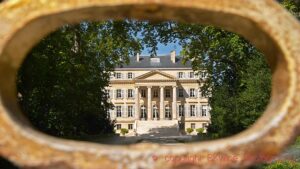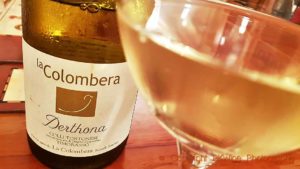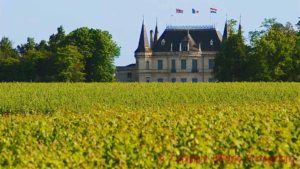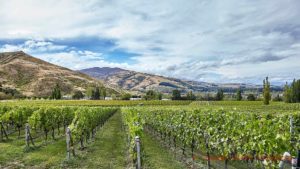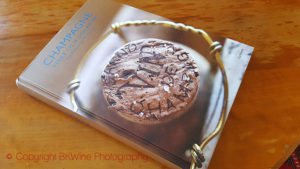Chateau Grand Barrail Lamarzelle Figeac
We’ve not yet gone across the river to the right bank, Rive Droite, so this morning we make the short trip over the Dordogne up to Saint Emilion: Chateau Grand Barrail Lamarzelle Figeac, not far from Figeac itself (and in the “secteur” in Saint Emilion called Figeac). Romuald Hebrard the winemaker takes us out into the vineyard to explain about the growth of the vine at this time of spring. We look at training methods, why the vines are pruned at a certain height, buds and counter-buds (or whatever they might be called, les contre-bourgeons)… In the wine cellar they have a very unusual and interesting destalking and sorting machine, a type of egrappoir that at the same time destalks and is capable of separating riper gripes from less ripe ones. Impressive technology. Also the barrel cellar is impressive, in a similar circular design as Lafite had, albeit a bit more modest in size. And you have to take care to not be showered by the spittoon sprinklers! The winery also has a shop where you can of course by the wines from the chateau, but also from quite a few other Bordeaux chateau. Well placed on the road leading to Saint Emilion.
Chateau Moulin du Cadet
We’re not quite yet getting hungry but lunch is approaching so we head towards our next (and lunch) appointment, Chateau Moulin du Cadet in the “Secteur Cadet” just north of the small town of St Emilion. Moulin du Cadet is run by Pierre Blois since some years back (once upon a time it was bought by his father-in-law). It is one of only a handful of properties in the whole of the Bordeaux region that is run according to biodynamic principles. (The neighbour is another one, Chateau Fonroque, run by Pierre’s brother-in-law, Alain Moueix.) Pierre Blois says that one of the effects of working biodynamically is that the wines become much more mineral. So what does ‘mineral’ mean? Well, he says, it’s a slightly salty taste, in particularly in the after-taste. He also makes some other descriptions: it’s as if you tasted a stone (mineral), or as if you had butterflies in the mouth (in the way that it has no heaviness, but much elegance and delicate flavours), or, as the French sometimes say, it’s “droit”, i.e. “straight” (this is in contrast to being round, soft of fat); sometimes also “aerien” (“airy”), in contrast to “terrien” (“earthbound”, rather than earthy). Perhaps not very easy to understand when one reads it but quite good descriptions when you have the wine in the mouth and can feel it. And there is often, when tasting bio-dynamic wines, a certain clarity and crispness in the mouth. If it is due to bio-dynamics, or if it is simply due to very good winemaking is anyone’s guess. We have the opportunity to taste Pierre’s wine over lunch, a harvest workers’ lunch (although it’s springtime) in the barrel aging cellar, both his Chateau Moulin du Cadet and his other label Chateau Cadet Fontpierre. Probably the best grilled entrecote we’ve ever had! Must remember to get the name of his butcher!
Saint Emilion
You just have to stop for a walk in Saint Emilion itself, if you’re nearby, so we do. It’s a wonderful town or village (can’t quite decide if it’s a small town or a big village) with medieval streets. A must see. (But perhaps not in peak tourism season since it’s one of the main French tourist attractions, on the Unesco list of World Heritage sites. And when you’re there you must try the ‘macarons de Saint Emilion’, small, soft and succulent almond biscuits. Delicious. And maybe buy a souvenir merlot wine that are on sale in many of the wine shops in the village?
Bordeaux city
Time to head back to Bordeaux city and have a night in town!
We’ve certainly been ‘gatés’ by all the winemakers and by the weather this time round!


